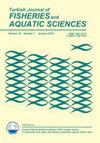Development of a Quantification and Detection Method for 2-MIB-producing Cyanobacteria
IF 1.7
4区 农林科学
Q3 FISHERIES
引用次数: 0
Abstract
Consumers often complain about taste and odor (T&O) in drinking water and freshwater fishery. One of the common T&O compounds, 2-methylisoborneol (2-MIB), can be detected by humans even when the concentration is below 10 ng/L. A forecast method of T&O occurrence is required to control drinking water plants and fishery farms to determine the timing of exchange of activated carbon or exchange the water in earthy pond. Traditional monitoring methods such as PCR, microscopy, and chemical analysis require a long time, are high in cost, and have a complex operation. We conducted this study to develop whole-cell PCR and whole-cell qPCR assays for rapid detection and quantification of 2-MIB-producing cyanobacteria without DNA extraction to detect 2-MIB cyclase gene (mtc). Pseudanabaena foetida strain 1705-12 (Lake Kasumigaura), strain 1803-12 (Lake Kasumigaura), and strain PTG (Lake Biwa) of 2-MIB-producing cyanobacteria were used in the study. The positive correlation between the results of whole-cell PCR, whole-cell qPCR and chlorophyll a (Chl.a), and gene abundances illustrated that whole-cell PCR and whole-cell qPCR assays could rapidly and conveniently detect and quantify 2-MIB-producing cyanobacteria. Thus, this study provides a valuable tool for prediction of T&O events in drinking water and freshwater fishery.2-MIB产蓝细菌定量检测方法的建立
消费者经常抱怨饮用水和淡水渔业的味道和气味。一种常见的T&O化合物,2-甲基异戊烯醇(2-MIB),即使在浓度低于10ng/L时也能被人类检测到。控制饮用水工厂和渔场需要一种T&O发生的预测方法,以确定活性炭交换或土塘水交换的时间。传统的监测方法,如PCR、显微镜和化学分析,需要很长时间,成本高,操作复杂。我们进行了这项研究,开发了全细胞PCR和全细胞qPCR检测方法,用于在不提取DNA的情况下快速检测和定量产生2-MIB的蓝藻,以检测2-MIB环化酶基因(mtc)。本研究使用了产2-MIB的蓝藻Pseudanabaena foetida菌株1705-12(Kasumigaura湖)、菌株1803-12(Lake Kasumigaula)和菌株PTG(Lake Biwa)。全细胞PCR、全细胞qPCR和叶绿素a(Chl.a)的检测结果与基因丰度呈正相关,表明全细胞PCR和全细胞q聚合酶链式反应可以快速、方便地检测和定量产生2-MIB的蓝藻。因此,本研究为预测饮用水和淡水渔业中的T&O事件提供了一个有价值的工具。
本文章由计算机程序翻译,如有差异,请以英文原文为准。
求助全文
约1分钟内获得全文
求助全文
来源期刊

Turkish Journal of Fisheries and Aquatic Sciences
FISHERIES-MARINE & FRESHWATER BIOLOGY
CiteScore
3.10
自引率
0.00%
发文量
43
审稿时长
3 months
期刊介绍:
Turkish Journal of Fisheries and Aquatic Sciences" (TrJFAS) is a refereed academic journal has been published by Central Fisheries Research Institute of Turkey and Japan International Cooperation Agency (JICA), and published in English.
It aims to address research and needs of all working and studying within the many varied areas of fisheries and aquatic sciences.
The Journal publishes English language original research papers, critical review articles, short communications and technical notes on applied or scientific research relevant to freshwater, brackish and marine environments.
TrJFAS was published biannually (April & November) between 2001 and 2009. A great number of manuscripts have been submitted to the journal for review from acceptance of the SCI index. Thereby, the journal has been published quarterly (March, June, September and December) from 2010 to 2017. The journal will be published monthly in 2018.
 求助内容:
求助内容: 应助结果提醒方式:
应助结果提醒方式:


